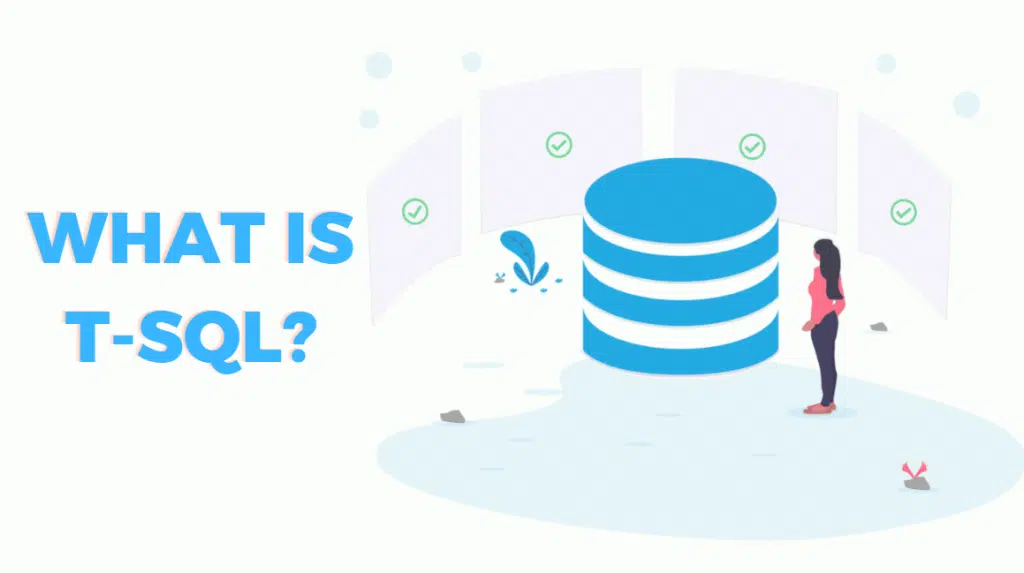SQL vs T-SQL: What’s The Differences?


The SQL vs T-SQL debate, often focusing on the difference between TSQL and SQL, has been a significant topic in the database development community. Understanding the difference between SQL and TSQL is crucial, as both languages offer benefits and drawbacks, influencing your preference. Nonetheless, there are some important differences between them to keep in mind. After reading this article, you’ll have a solid grasp of these differences, helping you pick the language that best fits your needs.
SQL, often called “SQL,” is a programming language known for its role as a query language. This type of language is essential for interacting with databases.
Primarily, SQL functions to add, access, or modify data within various databases. Its universal application across different database systems means that mastering SQL basics can significantly benefit a career in data.
In the realm of business operations, databases and their data are crucial. Consider a retail company that stores details about orders or customers in a database. SQL is the programming language enabling the company to manage and utilize this data effectively.

What is SQL?
In exploring what is T-SQL vs SQL, it’s clear that Transact-SQL, often abbreviated as T-SQL or TSQL, extends the capabilities of standard SQL and is primarily used in Microsoft SQL Server. It includes all the features of SQL along with additional functionalities.
When considering what is the difference between SQL and T-SQL, think of T-SQL as a specialized version of SQL, tailored for specific scenarios. It’s similar to the standard SQL but has unique features and variations.
Standard SQL has specific guidelines but permits database vendors to introduce their unique extensions. T-SQL serves this purpose for Microsoft SQL Server databases, playing a key role in executing most operations within the software.

What is T-SQL?
Many major database vendors have extensions to SQL tailored to their products, and T-SQL is a prominent example, especially due to the popularity of Microsoft SQL Server.
When you write queries in Microsoft SQL Server, you use T-SQL. All applications interacting with SQL Server, regardless of their interface, use T-SQL statements for communication.
Beyond SQL Server, other database management systems also accommodate T-SQL. For instance, Microsoft Azure SQL Database supports most T-SQL features.
T-SQL is crafted to enhance the efficiency and ease of use of databases that support it.
Learn more about SQL and databases with TECHVIFY:
Types of NoSQL Databases: Standout Features and Real-life Applications
| Feature | SQL | T-SQL |
| Ease of Learning | SQL is known for its straightforward and user-friendly nature. It has a clear and concise syntax, making it easy for beginners to grasp. The abundance of learning resources further aids in its accessibility. | While building upon the foundation of SQL, T-SQL introduces additional features and complexities. This may present a steeper learning curve for beginners, especially in understanding its extended functionalities. |
| Performance | SQL is highly optimized for performance, particularly in querying and manipulating data within relational databases. Its design ensures efficient handling of standard database operations, making it a reliable choice for various applications. | T-SQL offers enhanced performance capabilities, especially for specific types of queries and operations unique to Microsoft SQL Server. Its additional features can improve efficiency in certain scenarios, particularly those involving complex data manipulation. |
| Standardization | As a standardized language, SQL boasts a well-defined syntax and structure. This standardization ensures that code written in SQL is easily portable across various database management systems, contributing to its widespread adoption. | As a proprietary extension developed by Microsoft, T-SQL is tailored specifically for SQL Server. This means that while it extends SQL’s capabilities, it may need a different level of portability than standard SQL, potentially leading to challenges when working with other database systems. |
| Security | SQL includes comprehensive security features designed to protect against various threats, including injection attacks. It also supports robust user authentication and permission systems, helping maintain data integrity and privacy. | T-SQL encompasses all the security features in standard SQL and additional capabilities tailored to Microsoft SQL Server. These extended features provide an extra layer of security, particularly beneficial in environments heavily reliant on Microsoft’s database solutions. |
In addition to their broader differences, SQL and T-SQL have variations in certain command keywords. T-SQL includes functions absent in standard SQL.
For instance, when selecting the top X number of rows, standard SQL uses the LIMIT keyword, while T-SQL employs the TOP keyword.
Both commands achieve the same result. As demonstrated in the examples below, each query retrieves the top ten rows from the user’s table, sorted by the age column.
SQL Example

SQL Syntax
T-SQL Example

T-SQL Syntax
T-SQL includes features not found in standard SQL. A notable example is the ISNULL function, which substitutes NULL values in a given column. For instance, any NULL values in the age column would be returned as “0” using this function.

T-SQL Syntax most noticeable difference
Please feel free to contact us for a free consultation: Data Engineering Services
1. Advantages and Disadvantages of using SQL
| Advantages of Using SQL | Disadvantages of Using SQL |
| User-Friendly and Intuitive: SQL’s high-level language nature makes it more akin to human language, enhancing its accessibility and ease of understanding. | Complexity: Managing and manipulating larger, intricate databases can become complex, posing challenges for those who need more technical expertise. |
| Wide-Ranging Compatibility: As an industry standard, SQL works across relational database systems like MySQL, Oracle, and Microsoft SQL Server. | Limited Flexibility: Being a declarative language, SQL specifies what data is needed, not how to retrieve it, making it less adaptable for certain data manipulation tasks. |
| Ensuring Data Accuracy: Features like constraints and triggers in SQL maintain data integrity, ensuring reliability and consistency. | Scalability Challenges: SQL databases may need help with scalability, as they are not inherently designed to handle vast data volumes and high traffic of some modern applications. |
| Simultaneous Data Access: SQL allows multiple users to access and modify data concurrently, promoting efficient data management. | Vendor Dependence: Some SQL databases are proprietary, leading to potential difficulties and costs if transitioning to a different system is needed. |
| Robust Data Security: SQL includes security measures like user accounts and permissions to protect database access and data manipulation. | Performance Issues with Large Data Sets and Complex Queries: SQL’s efficiency can decrease with larger data sets and more complex queries, impacting performance. |
2. Advantages and Disadvantages of using T-SQL
| Advantages of Using T-SQL | Disadvantages of Using T-SQL |
| Stored Procedures: Offers pre-compiled SQL commands for enhanced performance, reducing the need for repeated parsing and compilation. | Server Limited: Exclusive to Microsoft SQL Server, which can be limiting when transferring code to other database systems. |
| Triggers: Supports triggers that automatically run in response to data modifications, useful for enforcing business rules or tasks. | Compatibility Issues: While similar to ANSI SQL, T-SQL’s unique features may not work with other systems. |
| Cursors: Enables processing of result sets one row at a time, ideal for large data sets or complex operations. | Performance Constraints: T-SQL might be less efficient than other data analysis languages or tools for some queries and tasks. |
| Error Handling: Provides comprehensive error-handling capabilities for structured management of errors and exceptions. | Scalability Challenges: Although SQL Server can handle large data volumes, T-SQL might not be the best for large data sets or high-performance computing. |
| Extensibility: Allows the creation of user-defined functions and types, expanding the language’s functionality. | Limited Community Resources: T-SQL has less extensive a community or fewer resources than languages like Python, R, or Java. |
SQL and T-SQL each have their strengths and are utilized in different settings. SQL is a standardized language for relational databases, supported by various database management systems, including Microsoft SQL Server, Oracle, MySQL, and PostgreSQL. It is widely used and backed by a large community of developers and data professionals. The most recognizable use cases are:

SQL vs T-SQL
In contrast, T-SQL is a proprietary language designed specifically for use with Microsoft SQL Server. It offers additional features and syntax not present in standard SQL, giving it greater power and flexibility. T-SQL also integrates more closely with other Microsoft technologies and tools.
SQL is more universally supported and utilized, making it a valuable skill for developers and data professionals working with relational databases. With its advanced capabilities and adaptability, T-SQL is especially useful for those working with Microsoft SQL Server. The right option varies based on the individual situation and needs. Both languages have advantages and can be effectively used in the appropriate situations.
Choosing between SQL vs T-SQL depends on your project’s specific requirements. SQL is universally applicable and ideal for general database management, while T-SQL is tailored for Microsoft SQL Server, offering advanced features.
For personalized guidance in making the right choice or for expert database services, consider reaching out to TECHVIFY. Our experienced team can provide the best choice guide and support tailored to your needs. Contact TECHVIFY for expert assistance in your database development journey.


Table of ContentsI. SQL vs T-SQL: Overview1. What is SQL?2. What is T-SQL?II. Key Differences between SQL and T-SQLIII. Advantages and Disadvantages of using SQL vs T-SQLIII. SQL vs. T-SQL: Which is the Better Fit?Conclusion Technological advancements are paving new paths for companies across different sectors, and the logistics industry is no exception. According to a survey by Gartner, 87% of supply chain professionals plan to invest in enhancing the resilience of their platforms. Logistics encompasses a broad and complex array of processes that demand the utmost precision and continuous optimization. Companies can automate and streamline these processes through software…
26 July, 2024

Table of ContentsI. SQL vs T-SQL: Overview1. What is SQL?2. What is T-SQL?II. Key Differences between SQL and T-SQLIII. Advantages and Disadvantages of using SQL vs T-SQLIII. SQL vs. T-SQL: Which is the Better Fit?Conclusion The technology sector is advancing at an unprecedented pace, and the HR landscape is evolving right alongside it. To attract top talent, HR professionals and organizations need to stay ahead of emerging technology hiring trends. This year, we are witnessing significant shifts in hiring practices that will redefine our understanding of the future workforce. According to a Microsoft study, the number of technology jobs worldwide…
25 July, 2024

Table of ContentsI. SQL vs T-SQL: Overview1. What is SQL?2. What is T-SQL?II. Key Differences between SQL and T-SQLIII. Advantages and Disadvantages of using SQL vs T-SQLIII. SQL vs. T-SQL: Which is the Better Fit?Conclusion Customized software plays a major role in managing various tasks within the telecom industry. It is essential for allocating numbers to subscribers and managing networks through optimized and AI-enabled routing protocols. Additionally, it aids in detecting fraud with intelligent telecom software development solutions and maintaining detailed subscriber profiles, including comprehensive call recording reports. I. A Quick Look into the Telecommunication Industry The telecommunications industry enables…
24 July, 2024


Thank you for your interest in TECHVIFY Software.
Speed-up your projects with high skilled software engineers and developers.
By clicking the Submit button, I confirm that I have read and agree to our Privacy Policy